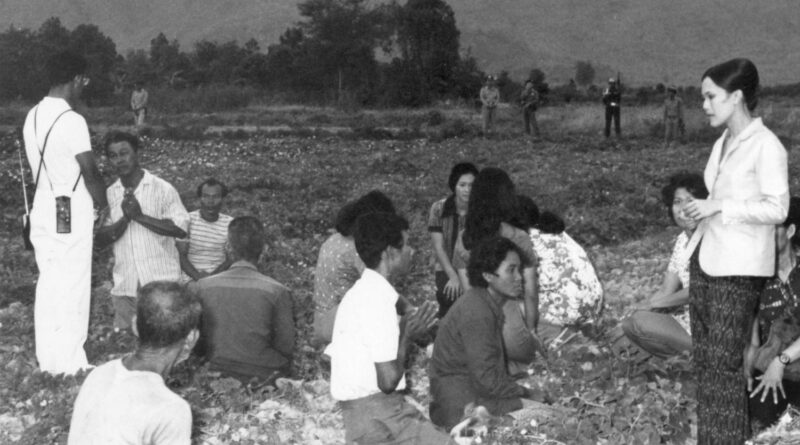A lifelong volunteer
From the day Her Majesty Queen Sirikit The Queen Mother was crowned in 1950, she was the greatest supporter of the late King Bhumibol Adulyadej as his reign began in the same year. The Queen Mother always accompanied His Majesty on royal duties in many provinces across Thailand, near and far.
Especially in 1956, when King Bhumibol entered the monkhood and Queen Sirikit was appointed Regent, she performed all royal duties on behalf of the King. Since then, she tirelessly devoted herself to the nation.
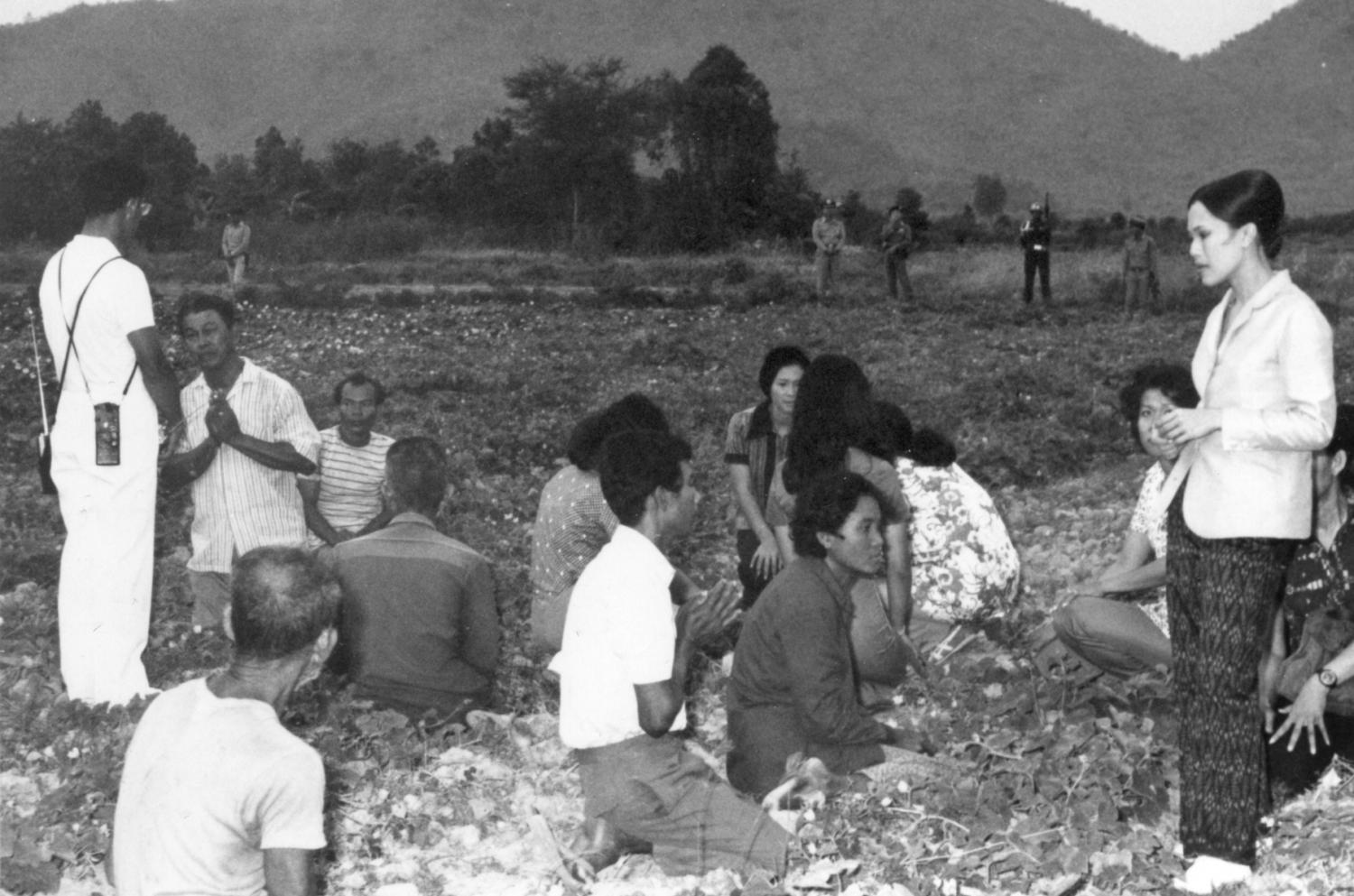
Their Majesties the King and Queen visited members of the Hupkrapong Agricultural Cooperatives at Cha-am district in Phetchaburi province.
Upon their permanent return from Switzerland to Thailand in 1951, King Bhumibol and Queen Sirikit worked endlessly for their subjects, making royal visits to communities far and wide, addressing misery and hardship, and bringing a long period of peace to the country.
Queen Sirikit herself set up a number of royal initiatives, reaching into every nook and cranny of people’s lives. With compassion, devotion and self-sacrifice, she was truly a role model of volunteerism as seen from many of her projects.
Environment
Queen Sirikit expressed unwavering commitment to improving the quality of life for Thai people. She notably contributed to environmental stewardship, dedicating efforts to forest restoration and the promotion of human-forest co-existence.
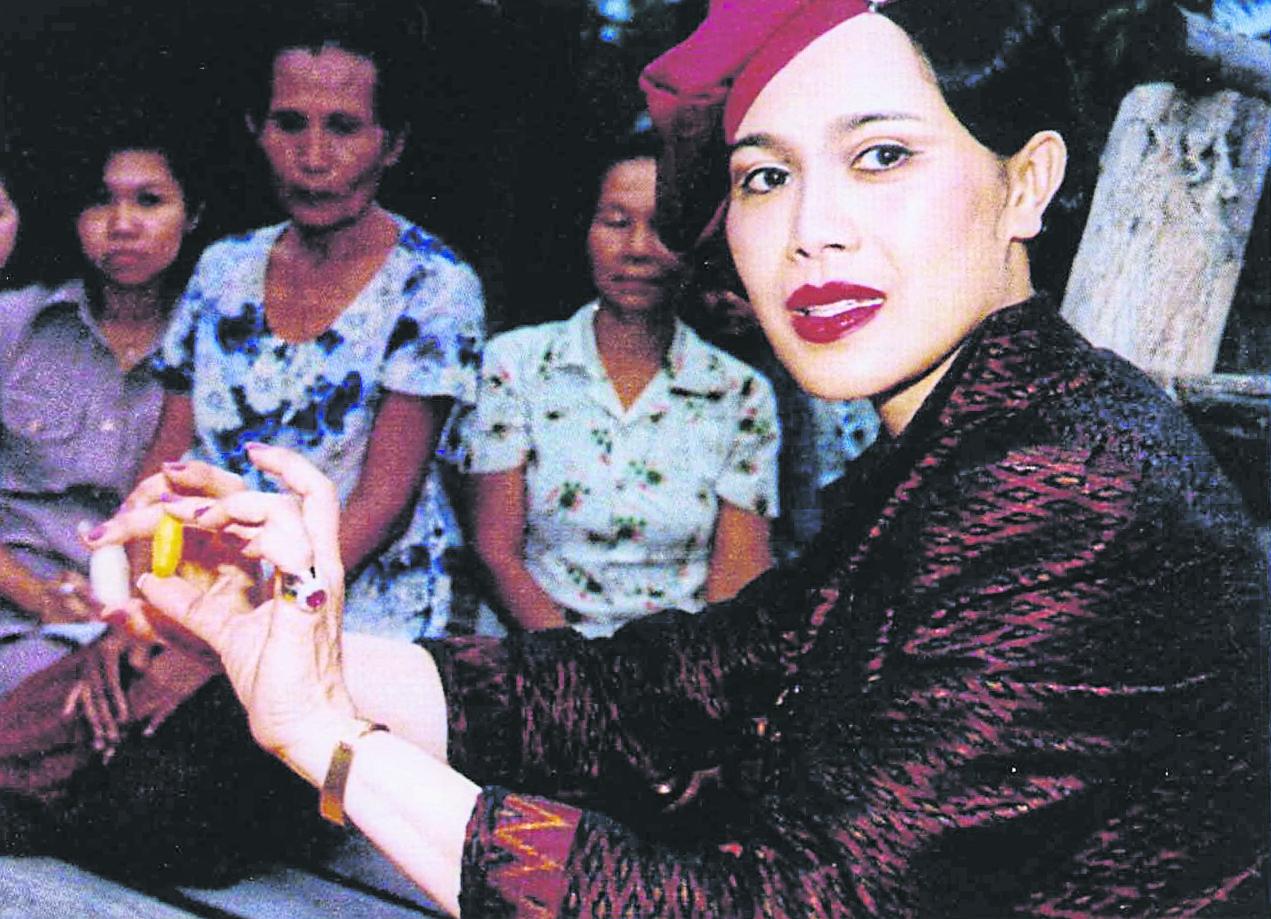
Her Majesty always paid attention to craftsmanship in each region and provided support so that it didn’t vanish.
During an audience at Dusit Palace on Aug 12, 1979, Queen Sirikit said: “To be honest, my father’s words in childhood always encourage me to serve my country. The King also reminds me that we are indebted to our nation. As a result, contribute something as if in debt.”
Queen Sirikit observed that deforestation led to man-made disasters including drought, soil erosion and crop failure which caused a great deal of suffering to people in remote areas. Her royal projects Pa Rak Nam (Forests Love Water) and Ban Lek Nai Pa Yai (Small House In The Big Forest) were launched to promote environmental conservation and livelihood.
Pa Rak Nam started in Song Dao district, Sakon Nakorn, on Dec 20, 1982, later expanding across the Northeast. Under the project, villages were established for the destitute to live and, at the same time, look after forests. For example, Queen Sirikit donated her personal funds to villagers in Baan Nong Phai, Sawang Daen Din district, Sakon Nakorn, for their protection of nature.
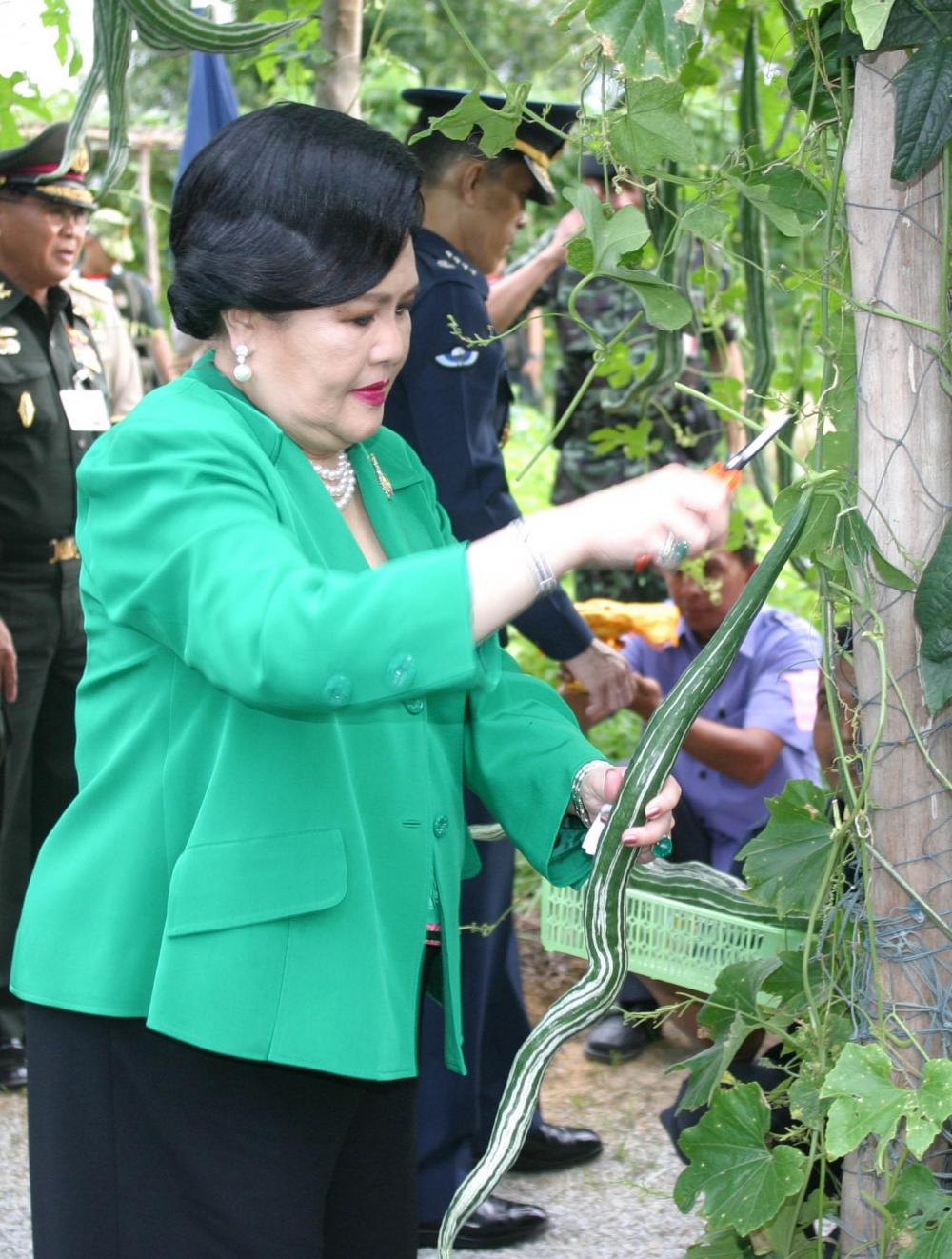
Her Majesty Queen Sirikit and then HRH Prince Maha Vajiralongkorn visited the Demonstration Farm in Narathiwat.
Ban Lek Nai Pa Yai was initiated when Queen Sirikit made a visit to Baan Huai Mai Hok, Om Koi district, Chiang Mai, on March 4, 1992, out of concern that deforestation and hunting would cause irreparable damage to the flora and fauna. Her initiative sought to promote people’s livelihood, environmental conservation and forest restoration to bring about human-nature co-existence.
Queen Sirikit also initiated highland agricultural development centres in Chiang Mai, Chiang Rai and Nan. The project covered forest restoration, wildfire prevention, land management, and soil and water conservation, among others. She also kicked off exemplary farms to provide jobs for the unemployed. Efforts begun at Baan Khun Tae, Chom Thong district, Chiang Mai, in 1997, later expanding across the country.
Culture
During royal visits, Her Majesty took note of craftsmanship in each region — local wisdom that was passed through generations — at the risk of vanishing. It would be a huge loss if it had not been supported.
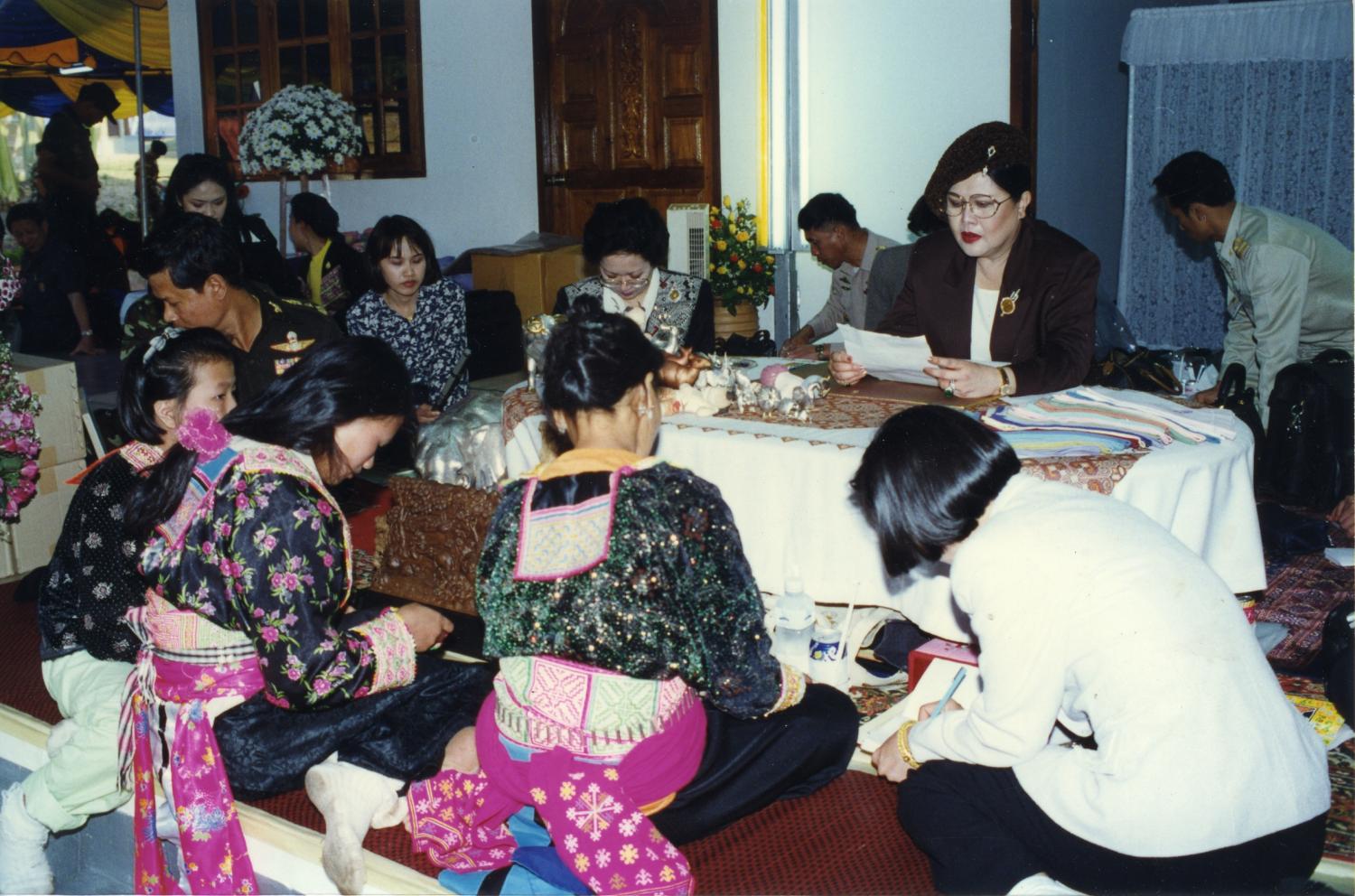
Training programmes from the Support Foundation enabled villagers to earn a supplementary income without having to abandon farming.
At an audience in Dusit Palace on Aug 11, 1992, Queen Sirikit said: “I always accompany the King on royal visits to provide relief to disaster-hit areas, which he noted is only a short-term measure. Despite the government’s policies to expand access to education, farmers rely on their children as their household workforce, depriving them of educational opportunities. Many left school after Prathom Suksa 4 [4th Grade] to support family.”
The Foundation for the Promotion of Supplementary Occupations and Related Techniques of Her Majesty Queen Sirikit of Thailand (Support Foundation) was established in 1976. Training programmes enabled villagers to earn a supplementary income without having to abandon farming. Queen Sirikit not only spearheaded the organisation, but also got involved in every stage of work, including interviewing trainees herself.
Headquartered at Chitralada Palace, the Support Foundation oversaw centres across the country, offering 26 training programmes ranging from weaving and carving to sculpture.
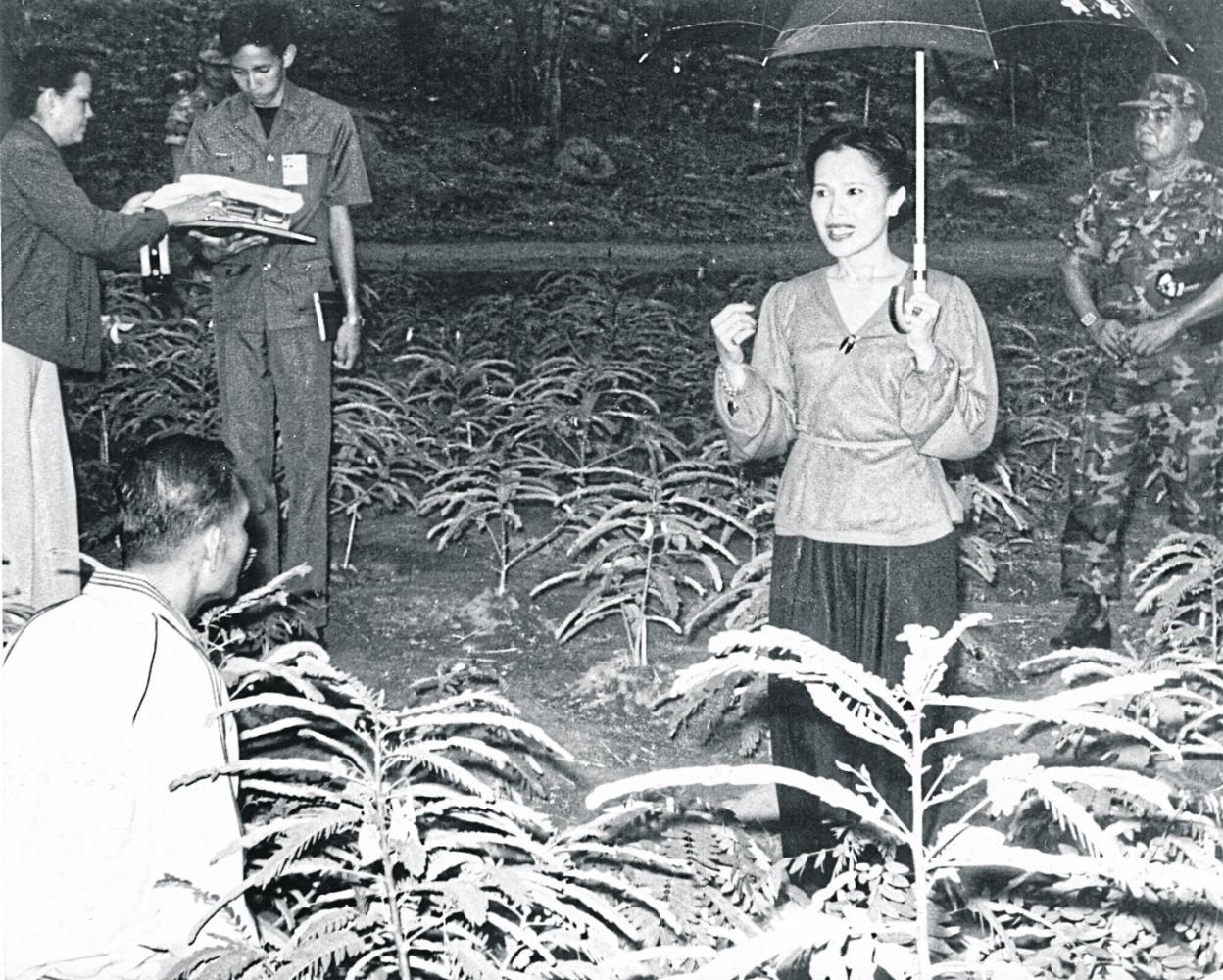
Queen Sirikit always showed dedicating efforts to forest restoration and the promotion of human-forest co-existence.
Queen Sirikit said: “Accompany the King on royal visits, I realised that Thais are of high artistic calibre, no matter how far from the capital. All the colours and intricate patterns are created by local people. I truly admire them for inheriting national art, even those who do not have any knowledge of handicrafts. In fact, they have artistic blood. Despite having a short training, they could produce art miraculously. Thais are the reservoir of heritage. Just give them a chance to shine.”
Through the Support Foundation, Queen Sirikit’s tireless devotion enabled farmers to enjoy a better quality of life, and, at the same time, preserve Thai culture for good.
Public health
At Chitralada Palace in 1988, Queen Sirikit was quoted as saying: “Health matters because it is the foundation of all living things. As the saying goes, a healthy mind in a healthy body. Healthy citizens have the ability to study, work and contribute to national progress. It is not wrong to say that they will build a strong nation.”
Queen Sirikit was compassionate and caring. During her royal visits, she asked doctors in attendance to check the health of citizens who were waiting to receive her, and forward those who were unwell to provincial hospitals. In some cases, people were hospitalised in Bangkok.
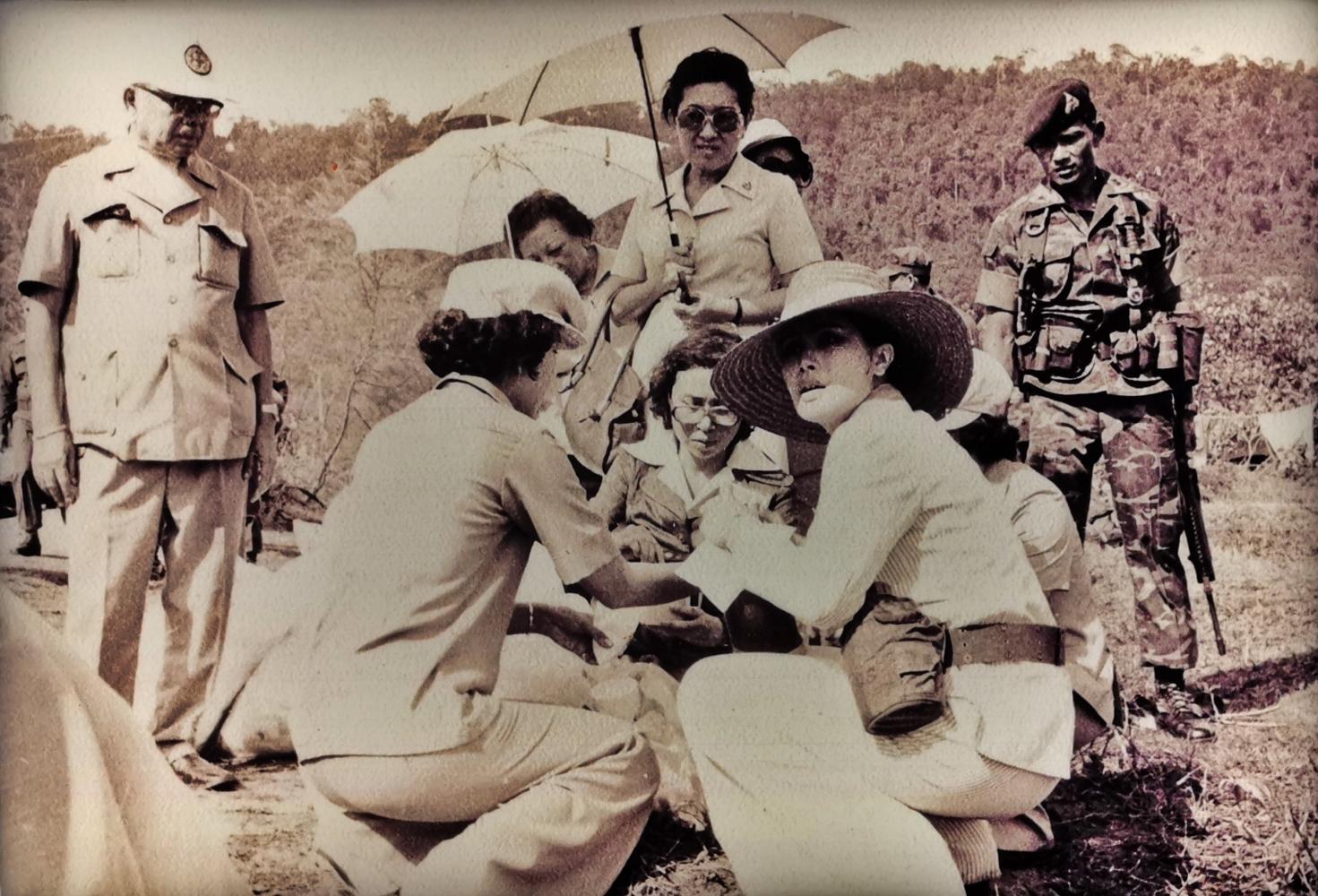
As president of the Thai Red Cross Society, Queen Sirikit visited Trat province where Cambodians fled war in 1978. Her Majesty later ordered the establishment of a Thai Red Cross Society Centre at Ban Khao Lan in the province.
In 1969, the royal medical unit project was launched to support those in remote areas. For those receiving treatment in Bangkok, Queen Sirikit also sent volunteers to offer encouragement. For those with an incurable condition, she offered scholarship or handicrafts training to support their livelihood.
In 1967, while at Klai Kangwon Palace in the Hua Hin district of Prachuap Khiri Khan province, Their Majesties arranged for doctors to provide medical support for people in Phetchaburi, Ratchaburi and Prachuap Khiri Khan. In other regions, similar efforts were launched to offer health services to people near their residences.
Queen Sirikit initiated the volunteer surgeon project in 1977 to support local doctors. It started in Sakon Nakhon, later expanding to other regions. She also set up the village doctor project, whereby skilled local residents received further training to share health knowledge in their communities.
During Covid-19, Queen Sirikit donated personal funds and medical equipment to operating rooms in support of medical staff.
Education
Queen Sirikit knew education is the most important foundation for people’s quality of life and she dedicated herself to improving children’s learning opportunities, both on a personal and larger scale.
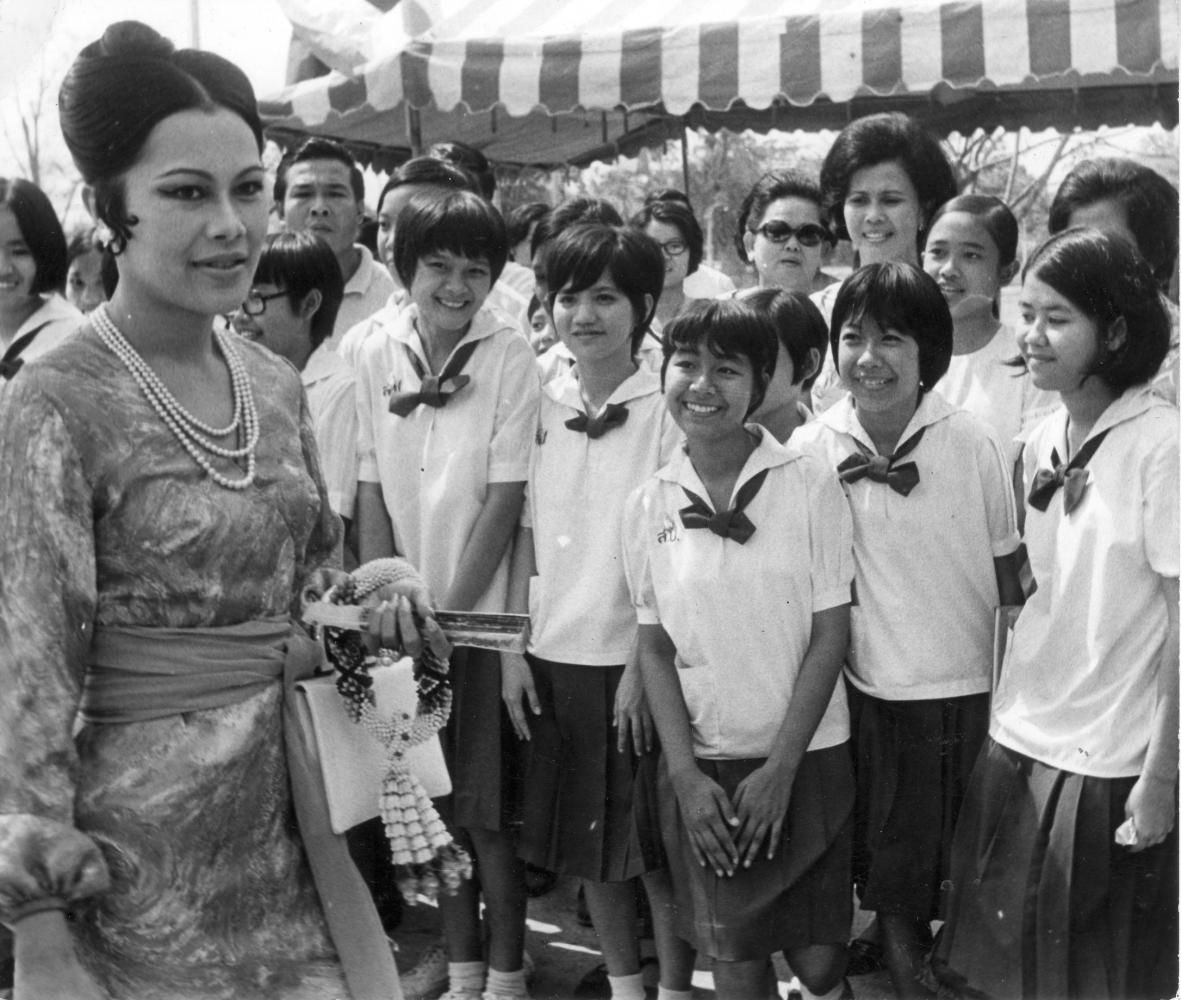
Queen Sirikit always supported education as the foundation for a good quality of life.
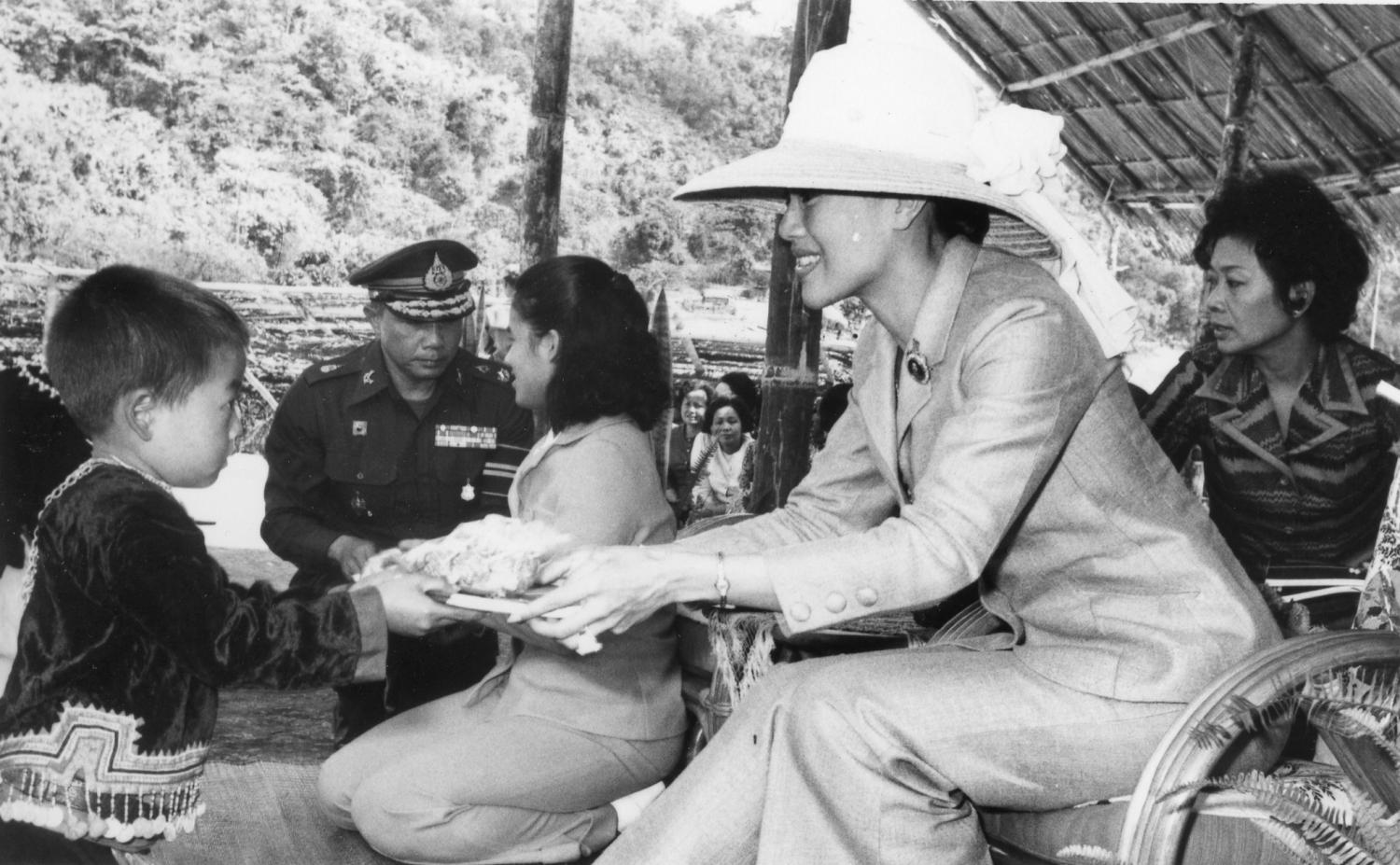
Queen Sirikit gave a present to one lucky boy in 1974.
Many times Queen Sirikit volunteered to teach impoverished children wherever she went. For example, back in 1978, when Her Majesty stayed in Klai Kangwon Palace, she usually provided schooling sessions for people who came for an audience. Sometimes it was a one-on-one session, sometimes in groups. All student data was recorded for close monitoring.
It offered children opportunities to read and write, while giving them knowledge about Buddhism, morality, health and sanitation as well as a love for the country.
Whenever she visited her arts and crafts projects, Queen Sirikit would always check through the nursery centres and offer to teach the children of project members.
Local learning centres called Sala Ruam Jai were initiated by Queen Sirikit as a self-learning community where local people could exchange knowledge. Her Majesty graciously provided books for each Sala Ruam Jai on Thai history, literature, religion, culture, morality and agriculture, as well as photobooks, magazines, calendars and other interesting materials so that people could have a wide variety of know-how on different topics.
Altogether there are seven Sala Ruam Jais across Thailand, including in Chiang Mai, Sakon Nakhon, Narathiwat and Pattani.
In 1962, Queen Sirikit graciously offered a founding budget of 13,500 baht for the construction of a school dedicated to the education of the Yao hilltribe in Fang district of Chiang Mai province. The school was named Jaomaeluang Uppathum 1 and opened in the following year. At first, there were 100 students, all from the Yao hilltribe. Then under supervision of the Border Patrol Police, the school was later transferred to the Ministry of Education and currently teaches students up to secondary level.

Queen Sirikit gave a present to one lucky boy in 1974.
In 1967, Jaomaeluang Uppathum 2 School was established in the Mae Rim district of Chiang Mai, providing education for Hmong children. The construction was made possible by Queen Sirikit’s personal contribution of 20,000 baht. The school was transferred to the Ministry of Education in 1980.
Queen Sirikit also provided scholarships to impoverished students nationwide while also monitoring their living conditions, financial status, grades and behaviour to ensure they fully benefited from the grants.
Queen Sirikit also provided royal scholarships for students with special needs, such as those at the Bangkok School for the Blind, the Northern Region School for the Blind in Chiang Mai and the Songkhla School for the Deaf.
Children with intellectual disabilities were supported at the Kawila Anukul School in Chiang Mai and Ubonpanyanukun School in Ubon Ratchathani, while children with limb impairments received royal scholarships to attend Srisangwal School in Nonthaburi.
Source – Bangkok News

